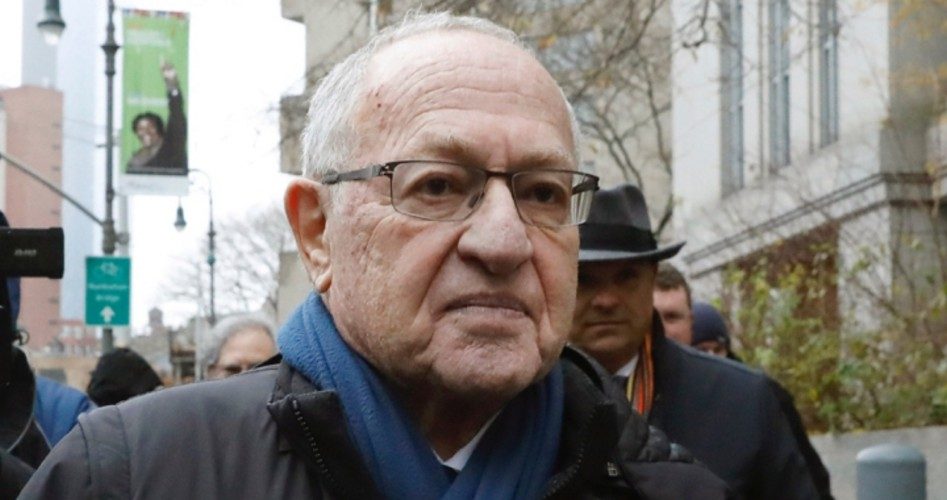
Podcast: Play in new window | Download ()
Subscribe: Android | RSS | More
Harvard law Professor Alan Dershowitz’s joining President Trump’s impeachment defense is hardly a surprise, given that Dershowitz (shown) has firmly opposed the effort, and last year called the plan to remove Trump with the 25th Amendment plan a coup attempt.
What might surprise some, however, is how the famous defense attorney, whose clients have included Claus von Bülow, O.J. Simpson, and Jeffrey Epstein, will defend the president.
On ABC’s This Week with George Stephanopoulos and CNN’s State of the Union Sunday morning, Dershowitz said he will argue that whatever Trump did as detailed in the articles of impeachment, to the degree he did it, is not impeachable conduct.
Channeling Benjamin Curtis
Dershowitz will use the same argument with which Benjamin Curtis, a former Chief Justice of the U.S. Supreme Court, defended President Andrew Johnson, he told Stephanopoulos. “Abuse of power” and “obstruction of Congress” are not impeachable offenses.
Before Dershowitz spoke, House Intelligence Committee chieftain Adam Schiff, a leader of the Trump impeachment gang, called that claim “absurdist.”
Stephanopoulos, a former legman for President Bill Clinton, asked Dershowitz why Schiff is wrong.
Curtis was “one of the most eminent jurists in American history,” Dershowitz said, and “made the argument that has been called absurdist, namely that when you read the text of the Constitution — bribery, treason, bribery, and other high crimes and misdemeanors — other really means that crimes and misdemeanors must be of kin — akin to treason and bribery.”
At minimum, the Harvard professor said, even if Trump didn’t commit a “statutory crime,” any impeachable offense would have to be “criminal in nature.”
“And the allegations in the Johnson case were much akin to the allegations here — abusive conduct, obstructive conduct — and that lost,” he said.
When Stephanopoulos said that the House case includes two crimes, Dershowitz observed that the impeachment articles “are two non-criminal actions, namely obstruction of Congress and abuse of power, and those … would have to be voted on by the Senate.”
Stephanopoulous: Let me press that, though. Is it your position that President Trump should not be impeached even if all the evidence and arguments laid out by the House are accepted as fact?
Dershowitz: That’s right. When you have somebody who, for example, is indicted for a crime — let’s assume you have a lot of evidence — but the grand jury simply indicts for something that’s not a crime, and that’s what happened here, you have a lot of evidence, disputed evidence, that could go both ways, but the vote was to impeach on abuse of power, which is not within the constitutional criteria for impeachment, and obstruction of Congress.
Dershowitz also said “abuse of power” is too thin a reed on which to hang an impeachment.
“Half of American presidents in history, from Adams to Jefferson to Lincoln to Roosevelt, have been accused by their political enemies of abusing their power,” he said. “The framers didn’t want to have that kind of criteria in the Constitution because it weaponizes impeachment for partisan purposes.”
Unable to budge Dershowitz, the former Clinton factotum asked Dershowitz “as a citizen” whether “it’s OK for a president to solicit foreign interference in our election?”
There’s a big difference between what’s OK — what’s OK determines who — what you vote for who you vote for. I’m a liberal Democrat who’s been critical of many of the policies of the president. I’m here as a constitutional lawyer, a lawyer who’s taught for 50 years constitutional criminal procedure at Harvard, taught a course on impeachment, taught a course on constitutional litigation….
If the allegations are not impeachable, then this trial should result in acquittal, regardless of whether the conduct is regarded as OK by you or by me or by voters. That’s an issue for the voters.
But Stephanopoulos didn’t give up. “But what do you think?” he asked. “I’m asking what you think.”
“I’m not going to present my personal views on what I think,” the pro-Clinton Democrat replied. “I think that conduct does not rise to the level of an impeachable offense.”
Dershowitz said much the same thing on CNN.
Coup Attempt
Dershowitz told Stephanopoulous that his role on the defense is strictly limited to presenting the constitutional case against Trump’s impeachment.
That’s the same case he made last year when he vociferously reacted to the news that top FBI officials discussed trying remove Trump on the grounds of incapacity and using the 25th Amendment.
Dershowitz called the discussion an attempted coup d’etat, and accused the plotters of a “grievous offense against the Constitution.”
Dershowitz will argue before the Senate on Friday. The other high-powered member of Trump’s defense is Ken Starr, whose investigation of President Clinton led to his impeachment.
Photo of Alan Dershowitz: AP Images
R. Cort Kirkwood is a longtime contributor to The New American and a former newspaper editor.


